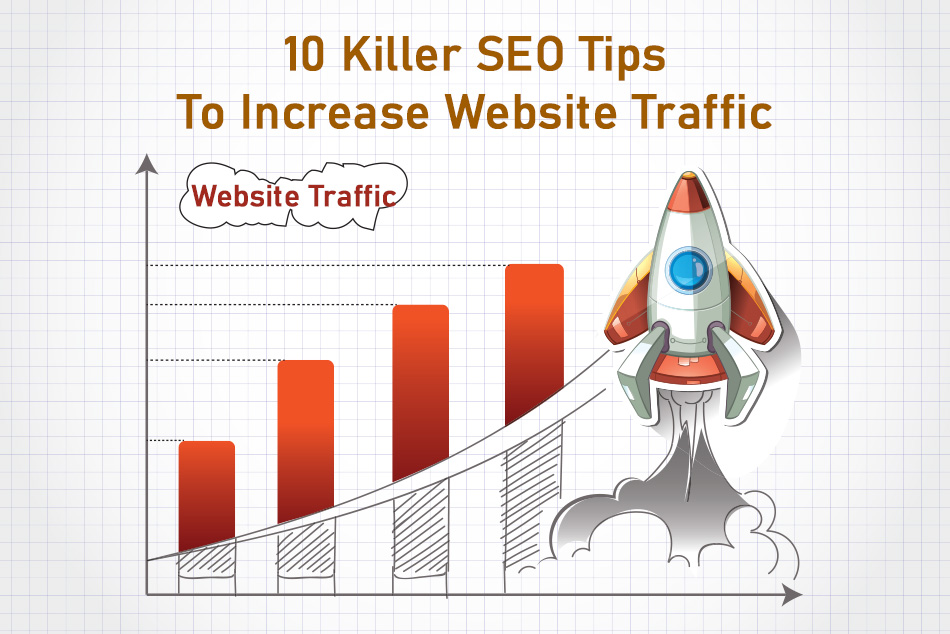Every business, small or big, requires to have a killer SEO to help it grow and reach more audiences every day. It can help business strategists find ways to make your target customers find you. Unless your business is known to the outside people, it won’t make any profit. This blog explains several SEO tips that can increase website traffic.
Table of Contents
What Is SEO?
SEO is known as Search Engine Optimization. It includes all the processes that website owners use to make their website rank as high as possible in search engines like Bing, Google, etc. Leveraging your website’s SEO is a must irrespective of what domain server you are using, like a dedicated server, VPS, or shared server. In simple terms, SEO refers to all the efforts made to improve the traffic quality and quantity, The traffic target is mainly unpaid.
SEO Tips Which Help To Increase Website Traffic
As already mentioned, many ways can help you increase traffic on your website, and one such way is SEO. To know some tips have a good SEO for your website, keep reading.
1. Focus on Relevant Primary and Secondary Keywords
Before you start working on content or a blog, plan out the relevant primary and secondary keywords. Using those keywords effectively on your write-ups can help you gain traffic to your posts. Primary keywords are those which are of utmost importance. You should have one primary keyword for each of your pages. It should be related to your topic, brands, or products/ services.
Whereas, secondary keywords can be more than one. They mostly represent the subtopics of the article you are writing for your website. It is important to check that the keywords are not forcefully included in the blog, it should be as natural as possible.
If you are confused with your primary and secondary keywords, use tools like Keyword Magic Tool to find relevant keywords for your topic.
2. Publish Good Quality Content
All things aside, publishing information-rich content is very important. Hypothetically speaking, even if your website starts ranking higher, it will stay there for a short time only as browsers won’t find interest in reading your articles much. If you want your readers to return to your website for information, provide good content. Your website will be engaged for a long time.
Your content will reflect your perspective and help build a relationship with your audience. Try to publish comprehensive content, the information you provide should answer all your audiences’ queries. It is recommended to stay away from short-term sensational topics as that would engage the audience for a very short time and the pages would eventually become irrelevant.
3. Strategize Content as per Search Engine Rankings
As already mentioned above, to make your content rank higher, you should provide sufficient information that answers all the questions of your audience. For this, focus on featured snippets. These are a brief overview of the entire content of the website which appears at the top of the search results on search engines. They are highly helpful, and visible and attract more organic traffic as they appear on the top of the numbered results.
Most digital marketers try to secure this position for their website and to do so you need to optimize your content.
For the above-mentioned thing, you can use the Keyword Magic Tool. Once you have decided which content you want to optimize, search for relevant keywords from the Keyword Magic Tool. After this, check for the most featured content related to the keywords and focus on the questions and answers to that content. You will get enough ideas after studying the content and then edit your content accordingly.
4. Optimization of Pages and Meta Descriptions
The first things that your audience would look into are your title and meta description. Hence, needless to say, it should be as attractive as possible. This decides whether your audience wishes to read ahead or not. Anyway, if you are not satisfied with your title and meta description, you can always edit it. However, it is recommended to follow certain points while writing the title and meta description.
- The title should be 30 to 60 characters.
- The maximum character limit of the meta description should be 160 characters.
- Include the keywords in the title
- Let the audience know the uniqueness of your page
- The title and meta description for every page should be eye-catchy
5. Keep The URLs Short & Descriptive
Another tip to increase traffic is to plan your URL structure properly. If your URL is something simple, it will help the search engines to understand your content and also provide a user-friendly interface in the SERPs. A perfect URL should be something that can be easily read, has keywords, and is concise.
6. Delete Things Which Can Obstruct Your Website’s Loading Speed
The loading time of your pages or website not only takes affects users but also SEO. If your page takes too long to load, users might not patiently wait for it and instead click the Back button and move on to other options. This would increase the bounce rate. Hence, look for components in your page that might delay the page loading process and consider removing them.
7. Optimize Images
Another thing to consider to improve your SEO is to optimize your graphics. If you have many images on your page, try to optimize them, hence decreasing the file size without compromising on the quality. Check which size and format suit your readers the most and accordingly make the changes. Try including descriptive alt text for our images as this makes it more accessible for your readers. Another important thing related to your images is that do not forget to test them on mobiles.
Nowadays, most browsers use their mobile to browse any particular thing over the internet. Hence, your images should be functional on mobile phones as well.
8. Conduct Frequent Site Audits
Just like we keep revising our academic books before our exams, similarly, websites should be regularly audited as it helps to know if your site is user-friendly and functional. This will let you know all the faults on your website that your audience might experience. You can do this by creating a new project and mentioning the pages that you want to crawl. Provide additional specifications as required and run your site audit. You can also schedule it for a later time.
9. Keep A Check On Competitors
In every type of business, having an idea about your competitor’s or rival’s strategies is always a smart move. You should know if they are creating similar content and targeting the same audience. In such cases, try analyzing your competitors’ websites which will help you get more ideas to improve your content.
For identifying rivals, you can use Market Explorer to know the websites you are working on in the same niche. You will also get to know the amount of traffic their websites have. Another tool useful for improving SEO is Keyword Gap. This tool helps to find out the keywords because of which some websites are ranking higher and you are lagging.
10. Have Thorough Knowledge About SEO
Last, but not least, have thorough SEO knowledge. If you want your website to rank higher, you need to know all the details of SEO since Google’s algorithm keeps on changing. You need to keep yourself updated with the latest digital trends. For this, you can refer to several blogs, podcasts, e-books, webinars, videos, etc.
Conclusion
It is a fact that if you want your website to have huge traffic and keep ranking higher on search engines, you need SEO. Mastering SEO is a never-ending process, as the trends keep on changing and evolving. You need to continue to experiment and bring creativity to your website to help it evolve in this competitive market.
Lastly, even after implementing all the tips mentioned above and all your efforts, your website might now rank immediately because takes time and you need to have patience and continue working on your website for its improvement.


0 Comments